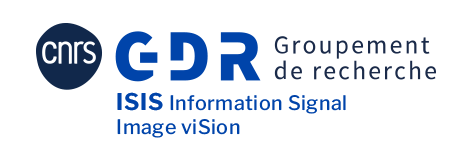GdR - ISIS: Doctorant Mobility Airbus/ESA/IRIT
10/06/2022
Opportunity for Doctorants: New position Airbus/ESA/IRIT
Phd position New approaches for validation of vision-based navigation for space application
Description
The development of vision-based navigation (VBN) algorithms for space applications often relies on simulated data: synthetic images from specialized software, real images from laboratory test benches or recordings of previous space missions. Applications range from in-orbit rendezvous to Solar system exploration missions. The definition of criteria and metrics for the validation and qualification of image generation methods remains an open issue. The objective of this Ph.D. is to bring a new perspective to this problem based on state-of-the-art knowledge in computer vision and image processing, in order to define guidelines for future missions.
The first task will be to critically review available references and formulate the right questions. Secondly, the core of the Ph.D. project will be to select relevant datasets, experiments and image processing algorithms to develop robust and representative tests and benchmarks. Lastly, the final objective of the project is to formalize a methodology that can serve as a future guideline for the qualification of test means and data sets for a given mission or algorithm.
Advising team
The Ph.D. candidate will join dynamic teams involved in many projects at various phases of development, from research and expertise to industrialization. The advising team will be shared between Airbus Defence & Space (Toulouse, France), ESTEC (ESA, Noordwijk, NL) and IRIT (Toulouse, France).
Airbus and ESA will bring skills, datasets, software, and test facilities in connection with their participation in major ongoing space programs. Notably, the work will be performed in collaboration with the research team REVA of the IRIT (Institut de Recherche en Informatique de Toulouse, UMR CNRS 5505) research laboratory whose members will provide expertise in computer vision and visual data analysis.
Requirements
The advising team is looking for a Ph.D. candidate from one of the ESA member states [1] with an M.Sc or Engineering degree in computer science, applied mathematics or physics and demonstrated experience in computer vision and computer graphics.
The candidate we are seeking must have:
◦ A background and interest in optics, detection physics, image processing, astronomy or space engineering are desirable.
◦ Strong analytical skills and ability to work at the intersection of different research domains.
◦ Good programming skills, namely in Python, C++ or Matlab, are needed as well as some knowledge of common programming libraries such as OpenCV and OpenGL.
◦ Excellent written and verbal English communication skills and an aptitude for working in an international context are required.
◦ The candidate shall be autonomous to drive his doctoral work among multiple international institutions, and advising teams. A keen interest in space applications will be also appreciated.
Application Documentation
The interested candidate shall send the following documentation to jose.antonio.lazaro@upc.edu before June 14th.
◦ A CV with a description of relevant experience,
◦ A motivation letter,
◦ One or more recommendation letters.
Selection
Review of applications will begin immediately. As part of the selection, short-listed candidates will be invited for an online interview before the end of June. Please note that only short-listed candidates will be contacted.
Ideally, the position is to start by October 2022.

Comparteix: